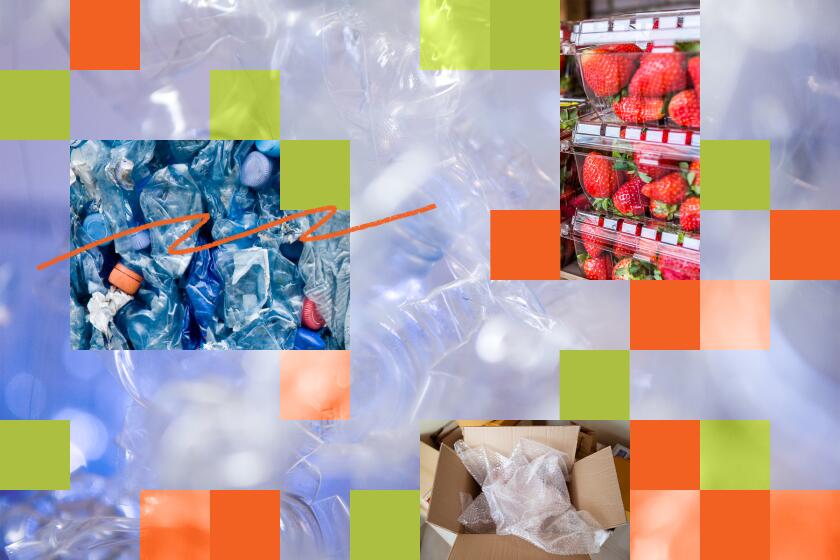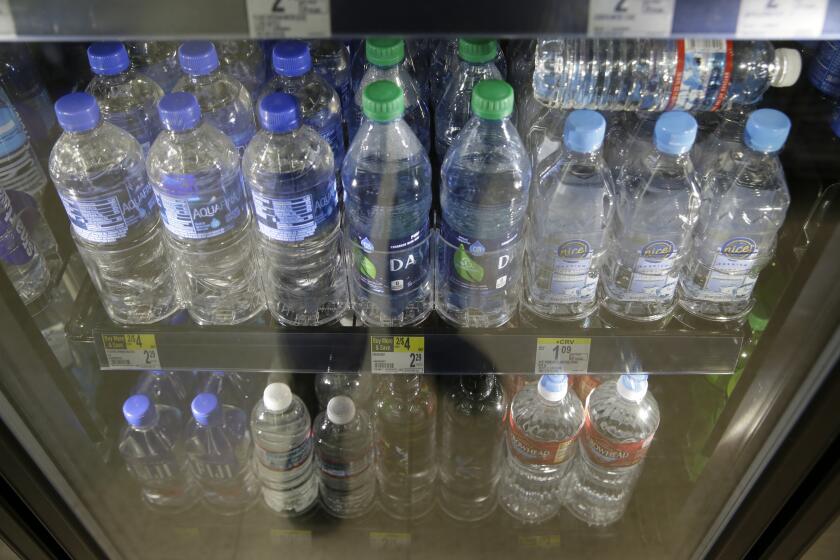
- Share via
California Atty. Gen. Rob Bonta has filed a first-of-its-kind lawsuit aimed at Exxon Mobil Corp. — one of the largest producers of petroleum-based polymers — for allegedly deceiving the public about the potential for plastic recycling and creating an environmental blight that has cost the state billions of dollars to clean.
The lawsuit, filed Monday in San Francisco Superior Court, accuses Exxon Mobil of falsely promoting plastics as universally recyclable when, in fact, the vast majority of these products cannot be reused. Decades of misleading marketing in newspaper advertisements, social media posts, television commercials and public statements caused consumers to buy and use more single-use plastic than they would have otherwise, Bonta alleged.
The lawsuit seeks to compel the oil giant to “end its deceptive practices” about plastics recycling, and asks the court to order Exxon Mobil to establish an abatement fund and pay financial penalties “for the harm inflicted by plastics pollution upon California’s communities and the environment.”
“The company has propped up sham solutions, manipulated the public and lied to consumers,” Bonta said at a news conference Monday. “It’s time Exxon Mobil pays the price for its deceit. It’s time Exxon Mobil is held accountable.”
Gov. Gavin Newsom signed into law a plastic bag bill that will ban stores from offering heavyweight “reusable” plastic bags at the checkout line.
“In the past decade, as we’ve been drowning in plastic waste, Exxon Mobil has increased its production capacity by roughly 80%,” Bonta said. “They are bullish on the plastics market. Our coastline, oceans, rivers and bays are swimming with plastic pollution that costs ... California taxpayers, over a billion dollars each year.”
Asked for comment Monday, Exxon Mobil said it was California that was to blame for the failure of plastic recycling.
“For decades, California officials have known their recycling system isn’t effective,” a company statement read. “They failed to act, and now they seek to blame others. Instead of suing us, they could have worked with us to fix the problem and keep plastic out of landfills. The first step would be to acknowledge what their counterparts across the U.S. know: advanced recycling works. To date, we’ve processed more than 60 million pounds of plastic waste into usable raw materials, keeping it out of landfills. We’re bringing real solutions, recycling plastic waste that couldn’t be recycled by traditional methods.”
Environmental groups lauded Bonta’s action and expressed optimism that this precedent-setting lawsuit could begin to stem the proliferation of plastics.
“This is the single most consequential lawsuit filed against the plastics industry for its persistent and continued lying about plastics recycling,” said Judith Enck, a former Environmental Protection Agency regional administrator and president of Beyond Plastics, an advocacy organization.
“The plastics industry has known for decades that — unlike paper and glass and metal — plastics are not designed to be recycled and therefore do not achieve a high recycling rate. Yet, the industry made every effort to convince the public otherwise while profiting off the planetary crisis it created,” Enck said. “This lawsuit will set an invaluable precedent for others to follow.”
However, at least one legal expert said the battle was likely to be long and intense. .
“Lawsuits against the fossil fuel companies for deception about climate change have been kicking around since 2008,” said Michael Gerrard, an environmental law professor at Columbia Law School. “They have put pressure on the companies to be more honest, but so far none has gone to trial or settled, and several have been dismissed. I’m sure that Exxon will resist this case as ferociously as it has the climate cases.”
Bonta did not mention if other oil companies would be investigated further. However, he said other states and public agencies could follow California’s example.
“Other states who have been harmed by Exxon Mobil ... should respectfully consider bringing their own lawsuit and fighting to hold Exxon Mobil accountable on behalf of their state or their public entity,” Bonta said.
The suit comes almost 2½ years after Bonta launched an investigation into the fossil fuel and petrochemical industries for their alleged role in causing and exacerbating a global crisis in plastic waste pollution.
At the time, Bonta said he’d subpoenaed Exxon Mobil Corp. seeking information related to the company’s “historic and ongoing efforts” to minimize the public’s understanding of the harmful consequences of plastic.
Bonta secured corporate documents via subpoena that provide the “fullest picture to date” of the oil giant’s “decades-long deception,” he said. According to the lawsuit, Exxon Mobil gave the the American Chemistry Council $19.4 million to run a deceptive ad campaign about so-called advanced recycling from 2020 to 2023. One ad that has been broadcast in California and elsewhere tells viewers: “Imagine a future where plastic is not wasted but instead remade over and over into the things that keep our food fresher, our families safer, and our planet cleaner,” according to the lawsuit.
The complaint asserts that the recycling rate in the U.S. has never exceeded 9% and that some 92% of plastic material processed through Exxon Mobil’s “advanced recycling” technology does not become recycled plastic. Instead, it is burned as fuel, according to the complaint.
“Contrary to the ad’s misleading claims, plastic cannot be ‘remade over and over,’” the lawsuit argues.
For more than 35 years, Exxon Mobil has promoted recycling as a key solution to the plastic pollution crisis in print publications, including the San Francisco Examiner, Los Angeles Times, Sacramento Bee and Oakland Tribune. In one 1988 print ad, the attorney general’s office said, the company falsely claimed that “[p]roper incineration of foam produces virtually nothing but harmless carbon dioxide and water vapor.”
The lawsuit alleges that Exxon Mobil, through a trade organization, co-opted the triangular “chasing arrows” symbol, which was originally created for paper recycling. The logo is commonly found on a number of products whether they are recyclable or not.
“Indeed, in practice, the symbol led consumers to believe that all labeled plastic items were recyclable, due to the chasing arrows symbol,” the complaint said. “Instead, the coding was intended to hide the limits of recycling, delay regulation, and pass responsibility for plastic waste onto consumers.”
The lawsuit seeks injunctive relief to protect the state’s natural resources from further pollution and destruction, as well as to stop the company “from making any further false or misleading statements about plastics recycling and its plastic operations.”
Gen Z has been heralded as being more invested in environmental issues. But a discussion with ‘green’ youths suggests the plastic habit may be hard to break.
Fossil fuels, such as oil and gas, are the raw material of most plastics. In recent decades, the accumulation of plastic waste has overwhelmed waterways and oceans, sickening marine life and threatening human health.
A separate lawsuit, filed by a consortium of environmental groups — including the Sierra Club, Surfrider Foundation, Heal the Bay and Baykeeper — was also announced Monday and mirrors many of the claims made in the attorney general’s lawsuit.
The announcement of the two lawsuits comes as state lawmakers seek to reduce plastic pollution at its source, with the passage and implementation of Senate Bill 54, the Plastic Pollution Prevention and Packaging Producer Responsibility Act — which seeks to turn the onus and cost of plastic pollution away from taxpayers and consumers and onto the producers and packagers.
It also comes amid a growing body of research showing the pernicious and ubiquitous nature of microplastics in the environment and within human bodies.
Micro- and nanoplastics are produced when plastic products break down. Petroleum-based plastics never fully decompose; they break down into smaller and smaller pieces, which have now been found in the deepest trenches of our oceans, in the snows atop the highest mountains, in our air, water, food and bodies.
Environmentalists hailed the lawsuits as much-needed corrections on an industry that has for decades produced products that have infiltrated the state’s waterways and contaminated human bodies.
“For 40 years, the Surfrider Foundation has been fighting to protect our ocean, waves, and beaches .... Despite these tireless efforts, 85% of items collected in our California beach cleanups in 2023 were still single-use plastics,” said Jennifer Savage, the Surfrider Foundation’s senior plastic pollution initiative manager. “Now, for the health of our ocean and the people who depend on it, we’re taking this fight to court to hold Exxon accountable for their contribution to the plastic pollution crisis.”
Since 1985, more than 26 million pounds of garbage has been collected from California beaches and waterways — roughly 81% of it plastic. Many of these discarded items can be traced to Exxon Mobil’s polymer resins, according to Bonta’s office.
Over the weekend, thousands of people gathered at California beaches for the annual Coastal Cleanup Day, which is touted as the state’s largest volunteer event. In Los Angeles County, Heal the Bay hosted cleanups at dozens of sites, picking up more than 11,000 pounds of trash.
“We can’t go on producing plastic at this rate. We need a real systematic change, and that’s what we’re hoping for,” said Tracy Quinn, chief executive of Heal the Bay. “We can’t recycle our way out of this problem. We can’t continue to pick up trash from our beaches forever. We need to stop this as a source — and what we hope to achieve with this lawsuit.”
Nanoplastics are microscopic flecks so small that they can be absorbed into human cells and tissue, as well as cross the blood-brain barrier.
Toward a more sustainable California
Get Boiling Point, our newsletter exploring climate change, energy and the environment, and become part of the conversation — and the solution.
You may occasionally receive promotional content from the Los Angeles Times.











